
JOIN US
GET OUR KUNEKUNE
NEWSLETTER
New and highly discounted products, fresh and hot stories & useful information
Health and Wellness Tips for KuneKune Pigs
By following some essential health and wellness tips for KuneKunes pigs, you can ensure your pigs are happy and healthy. KuneKune pigs are unique and adorable creatures that make wonderful pets and breeding stock animals. These smaller, friendly pigs are known for their docile temperament and love of social interaction. In this article, we will discuss three very important aspects of keeping them happy and healthy: diet, exercise, and veterinary care. So, let's learn how.
Click audio to have this article read to you while you are busy doing chores.
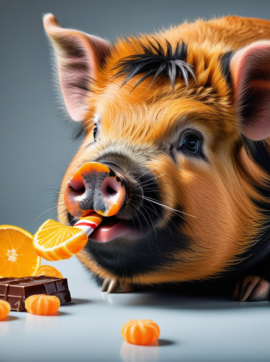
Diet
Ensuring a well-balanced diet for your KuneKune pig is vital for their overall health and well-being.
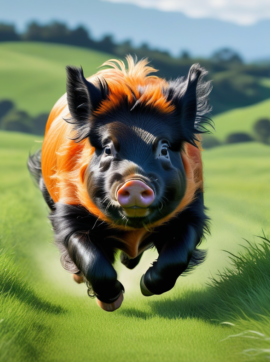
Exercise
KuneKune pig requires regular exercise and ample opportunities for physical and mental stimulation.
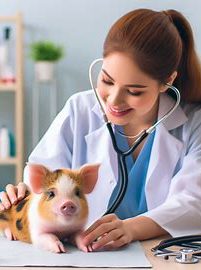
Vet Care
Between check-ups, it's also vital to watch for any signs of illness or injury to ensure healthy pigs.
Diet Essentials
Diet is crucial to maintaining your KuneKune pig's health. These pigs tend to gain weight quickly, so providing them with a balanced diet is important to prevent obesity. A diet rich in high-quality hay, fresh fruits and vegetables, and a small amount of pig pellets is ideal for KuneKune pigs. Avoid feeding them fatty or sugary foods, as this can lead to health issues such as diabetes and heart disease. However, like most animals, KuneKune pigs need the proper diet to promote their well-being and prevent obesity. A balanced diet for KuneKune pigs should consist of grazing, high-quality hay in the winter, fresh fruits, and vegetables, with pig pellets limited to prevent overeating and weight gain.
High-quality hay is essential to a KuneKune pig's winter diet when grazing is unavailable. It provides the necessary fiber to aid digestion and gastrointestinal issues. Hay also helps keep pigs' teeth healthy by providing mental stimulation through foraging. Make sure to choose hay free of mold and dust and replace it regularly to ensure this.
Fresh fruits should comprise a sizable portion of a KuneKune pig's diet as they are rich in vitamins, minerals, and antioxidants. Some good options include apples,
leafy greens, and squash. However, it is important to avoid feeding them onions, garlic, avocado, or any toxic foods to pigs. Variety is critical to providing a well-rounded diet, so try to offer a mix of different fruits and vegetables to make things interesting for your pig.
Pig pellets should only be given in small amounts to supplement their grazing diet. While they can be a convenient way to ensure your pig gets all the necessary
nutrients, overfeeding pellets can lead to obesity. Look for pellets formulated explicitly for pigs and avoid those with added sugars or fats. In most cases,
you will only feed 2 cups (8 oz cups) of grain twice a day, which can even be reduced when pastures are rich.
Feeding your KuneKune pig fatty or sugary foods can have serious health consequences, including diabetes and heart disease. These foods can also lead to obesity, which can put extra strain on their joints and organs. It is essential to resist the temptation to give your pig treats like donuts or candy and stick to a diet high in fiber and nutrients. Some good treats include apples, carrots, and cheerios.
When feeding your KuneKune pig, it is important to monitor their weight regularly to ensure they maintain a healthy body. Adjust their portion sizes and feeding frequency accordingly if you notice any changes in their weight. A good rule of thumb is feeding adult pigs around 2 cups of grain twice daily. Most reputable breeders prefer this.
In summary: A well-balanced diet is essential for your KuneKune pig's overall health and well-being. By offering high-quality hay, fresh fruits and vegetables, and limiting pig pellets, you can help prevent obesity and its associated health risks. Be mindful of portion sizes, monitor your pig's weight regularly, and adjust their diet as needed to keep them healthy and happy. Your KuneKune pig will thank you for it.
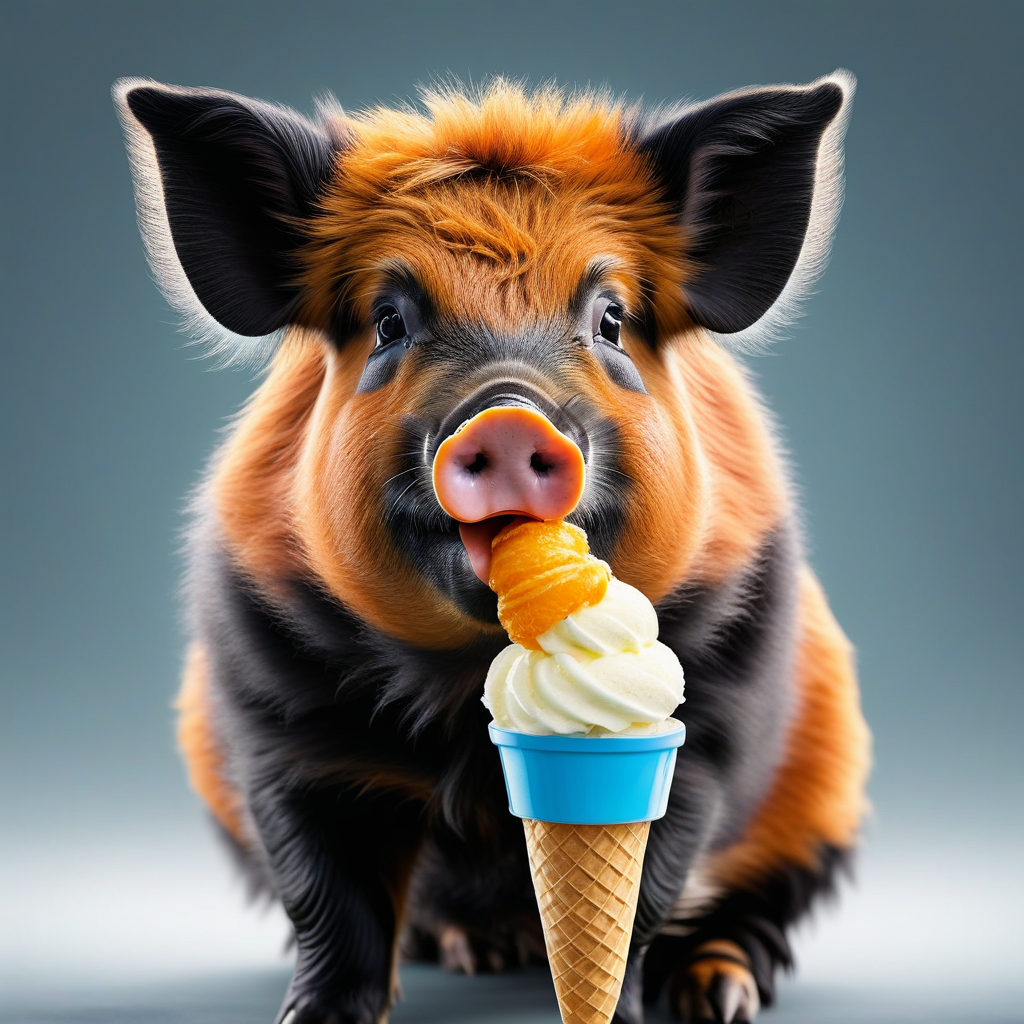
Exercise Tips
Exercise is also crucial for keeping your KuneKune pig in good shape. These pigs are naturally low-key and love to explore their surroundings, so providing ample space for them to roam is essential.
Here is a detailed guide on how to properly exercise and keep a KuneKune pig in good shape:
1. Understand the natural activity levels of KuneKune pigs: KuneKune pigs are known for their friendly and pleasant nature. They are curious animals that enjoy exploring their surroundings. They have moderate activity and need regular exercise to stay healthy and happy.
2. Provide ample space for them to roam: KuneKune pigs require ample space to roam and engage in physical activity. Ensure they can access a secure outdoor area to run, dig, and explore. The area should also be fenced to prevent them from wandering off and getting into trouble.
3. Engage in interactive play: KuneKune pigs enjoy playing with toys that stimulate their instincts, such as puzzle feeders or balls. Please provide interactive toys to encourage them to forage or engage in physical activity. This can help keep them mentally stimulated and prevent boredom. Use milk jugs with holes that allow the grain to fall through, hanging them right at snout level. You can hang them from a tree in their pasture. A simple Google search will give you tons of ideas as well.
4. Encourage natural behaviors: Allow your KuneKune pig to engage in natural behaviors like rooting and digging. Please provide them with a mud puddle to root or search for hidden treats in the soil. This will keep them physically active and fulfill their natural instincts.
5. Benefits of regular exercise: Regular exercise is essential for the health and well-being of KuneKune pigs. It helps maintain muscle tone, improves overall fitness, and prevents obesity. Exercise also helps reduce stress and boredom, contributing to their happiness and quality of life.
In conclusion, maintaining the health and well-being of a KuneKune pig requires regular exercise and ample opportunities for physical and mental stimulation. By providing them with a spacious outdoor area, taking them for walks in your pasture, engaging in interactive play, and encouraging natural behaviors, you can ensure that your KuneKune pig stays in good shape and leads a happy and fulfilling life.


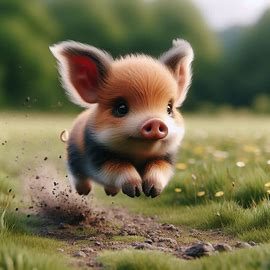
Photos for entertainment value
Veterinarian Care
Regular veterinary check-ups are not just a routine but a crucial aspect of maintaining your KuneKune pig's health. Your vet's guidance on vaccinations, parasite control, and general health maintenance is invaluable. Be vigilant for everyday health problems such as respiratory, skin, and dental issues. Keeping an eye on your pig's overall well-being and seeking prompt veterinary care can help prevent these issues from escalating.
The best time to find a vet is before you need one. Take time to speak with several vets in your area. While they may not have experience with the KuneKune breed specifically, most vets will have experience with pigs in general. A small animal vet that makes farm calls is the preferred option for most breeders.
Vaccinations are among the most important aspects of veterinary care for KuneKune pigs. Vaccinations protect your pig from a variety of diseases that can be harmful or even fatal. Your vet will recommend a vaccination schedule based on your pig's age, health status, and environment. Some standard vaccinations for KuneKune pigs include those for swine influenza, erysipelas, and parvovirus. Keeping up with your pig's vaccinations can help prevent serious health issues and ensure their overall well-being. Learning how to do vaccinations yourself using a slap shot is relatively easy and will save you in the long run.
Another crucial aspect of regular veterinary care for KuneKune pigs is parasite control. Pigs are susceptible to various parasites, including worms, mites, and ticks. Your vet can prescribe medications to prevent and treat parasite infestations, keeping your pig healthy and comfortable. Regular fecal tests can also help detect parasite infestations early on, allowing prompt treatment.
In addition to vaccinations and parasite control, regular veterinary check-ups also provide an opportunity for general health maintenance. During a check-up, your vet will examine your pig's overall health, including their weight, body condition, and any signs of illness. They can guide nutrition, exercise, and other aspects of care to keep your pig in optimal health. Your vet can also discuss any concerns you may have about your pig's health or behavior, providing valuable advice and support. A vet seeing them in their environment can often be helpful in the assistance they offer to you.

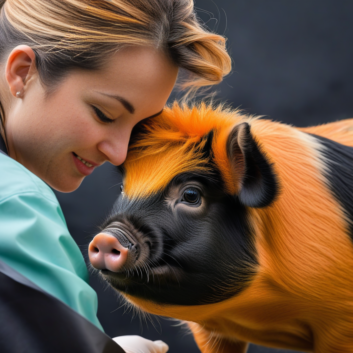

Photos for entertainment value
While regular veterinary care is essential for maintaining your KuneKune pig's health, it is also important to be vigilant for any signs of illness or injury between check-ups. Feeding time is a fantastic opportunity to watch your KuneKunes for early signs of diseases or behavioral changes. Common health problems to watch out for in KuneKune pigs include respiratory issues, such as coughing or wheezing; skin conditions, such as dermatitis or mange; and dental problems, such as overgrown teeth or tooth decay. If you notice any symptoms of illness or changes in behavior in your pig, it is crucial to seek veterinary care promptly.
Several practical tips can help you monitor and maintain your KuneKune pig's health effectively. First, establish a good relationship with a veterinarian who has experience with pigs and is familiar with their specific health needs. Schedule regular check-ups and keep up with your pig's vaccinations and parasite control. It's also important to monitor your pig's weight, body condition, and overall appearance regularly and provide a balanced diet, plenty of exercise, and a clean living environment.
In conclusion, regular veterinary check-ups are essential for ensuring the health and well-being of your KuneKune pig. By staying current with vaccinations, parasite control, and general health maintenance provided by a vet, you can help prevent serious health issues and keep your pig in optimal health. By being vigilant for any signs of illness or injury and seeking prompt veterinary care, you can provide your pig with the best possible care and contribute to their overall health and longevity. Remember, a healthy pig is a happy pig!
Key Take Aways
In conclusion, taking care of a KuneKune pig requires dedication and a commitment to their health and well-being. By providing a balanced diet, regular exercise, and attentive veterinary care, you can ensure that your KuneKune pig leads a happy and healthy life. Remember to show your pig lots of love and attention, as they thrive on companionship and interaction. With these tips, you can give your KuneKune pig the best possible care and enjoy many years of happiness together.
Additional Resources
Registry Office
17500 Hamilton Arms Court Dewitt, VA 23840